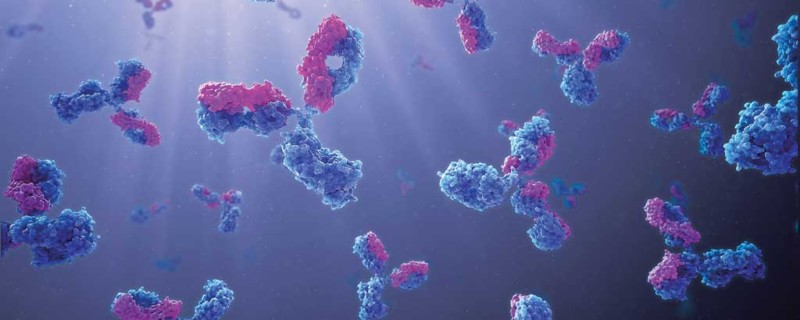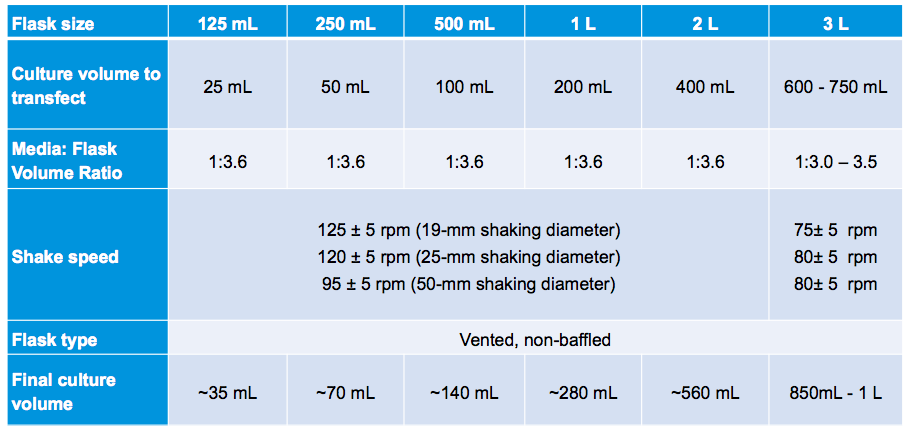
Best Practices for Rapid High Titer Protein Expression
Recombinant protein expression is critical to research, biotherapeutic drug discovery and structural studies. Choosing the right protein expression system is key and the specific requirements of each application should be carefully considered. For instance, protein solubility, functionality, time to material, and required yield are often important considerations when selecting expression method.
While individual application needs are important, there are goals that are universal to most transient protein expression activities – high yield as quickly as possible. Expression systems, such as the Gibco™ line of Expi protein expression systems, are designed to provide exactly that. The Expi systems provide cells, media, transfection reagents and a positive control, all optimized to work together to enable the highest protein yields quickly. They are available in both mammalian (HEK293, CHO) and insect (Sf9) formats.
| Gibco™ ExpiCHO™ Expression System | Gibco™ Expi293™ Expression System | Gibco™ ExpiSf™ Expression System |
|---|---|---|
 |  |  |
| Host type: Mammalian Cell line: High-yield ExpiCHO-S cells Days 7-14 Protein yield: Up to 3 g/L | Host type: Mammalian Cell line: High-yield Expi293F cells Days 5-7 Protein yield: Up to 1 g/L | Host type: Insect Cell line: High-yield ExpiSf9 cells Days 6-10 Protein yield: Up to 900 mg/L |
In an effort to share best practices for maximizing protein expression in transient and stable systems, we talked to Rich Altman and Matt McKenna, Field Application Scientists supporting the Expi Protein Expression Systems at Thermo Fisher Scientific, about maximizing protein expression and achieving high titer in Expi expression systems.
Best Practices for Maximizing Protein Expression
Know Your System Well Before Experimentation Begins
Rich and Matt explained that it is very important to fully understand the protocol and also your cells and their characteristics before beginning transfection. They recommend taking the time to carefully read protocols to reduce variability in your expression workflow.
Check Your Incubator
Before beginning work, both agreed that it is important to make sure that your incubator temperature, CO2 and humidity are all within specification. They recommend that regularly scheduled calibration protocols be in place and not to solely rely on the external display. Another basic tip that often gets overlooked in a busy lab is thoroughly cleaning the incubator periodically and adding an anti-microbial to the water pans. Also using sterile H2O to fill reservoirs is preferable.
Check Your Speeds & Culture Vessels
Equipment and vessels are another component that need to be checked. Check to make sure the speed of your shaking platform complies with the culture volume and flask size you plan to use. For flask size, they recommend maintaining a ~1:3.6 culture volume to flask size. If culture volume is too high or too low it can jeopardize the cell culture. For shaking speed, it is important to increase speeds as you decrease culture volume and decrease speeds as you increase volume.
Check Your Cells
Close monitoring of your cells is an important prerequisite to successful protein expression. They advise recording cell density, doubling time, viability, passage number, and noting any deviations. To ensure accuracy, perform multiple cell counts at different dilutions. Be sure to provide fresh media prior to transfection and thaw new cells periodically.
Check Yourself
Another area that can be overlooked, but is critical to success is creating a sterile working environment. These laboratory best practices can keep your process from getting derailed by inadvertent contamination. Key tips include dedicating one lab coat to cell culture, performing any bacterial work after cell culture, frequently changing gloves and using 70% ethanol to cleanse supplies. Lastly make sure the biosafety cabinet is free of clutter and any airflow blockage.
Maintain the Right Ratios for Scalable Protein Production
Flask size, expression volume, shake speed and orbital diameter are all critical factors for optimal protein expression and scalability. Rich and Matt reiterate the importance of maintaining an appropriate buffer volume to flask ratio. It is also imperative that the shaking speed be matched to both the culture volume and flask size to ensure cell health.
For Expi systems they recommend use of Nalgene vented, non-baffled flasks for best results. These are all good examples of the importance of following supplier recommendations. See Expi expression system recommendations below:

Advantages of using a system based approach like Expi Protein Expression Systems for transient protein expression
Because Gibco Expi Expression Systems bring together specialized high-density cells, media, and transfection technologies in a system-based approach, they are able to enable streamlined development of protein-based drugs and vaccines, so researchers like you can make life-changing discoveries faster.

About the Experts

Matt McKenna, Field Application Scientist, Thermo Fisher Scientific
Based in Massachusetts, USA
Born and raised in Massachusetts, Matt has spent the last 18yrs working in the Cambridge area in both large pharma and small biotech settings. While mostly focused on transient protein expression, Matt also has extensive experience in developing stable cell lines expressing monoclonal antibodies. Most recently at Pfizer, Matt helped develop an automated platform approach to transiently express hundreds of proteins per week in the Expi293 system.

Richard Altman, MS, Field Application Scientist, Thermo Fisher Scientific
Based in California, USA
Rich has 30 years of experience in protein expression and production. In early 2019, he joined Thermo Fisher Scientific as a Field Application Scientist. Previously, he worked for several pharmaceutical companies, including Amgen, Alexion, Bayer, and Upjohn, on the cloning, expression, purification and characterization of recombinant proteins. This work supported both small-molecule high-throughput screening and protein therapeutic efforts. He received his MS degree from the University of Pittsburgh School of Medicine in the Department of Molecular Biology and Biochemistry.
Learn more about the Gibco Expi Protein Expression Systems:
Expi Protein Expression Systems
Gibco Protein Expression Basics Educational Hub